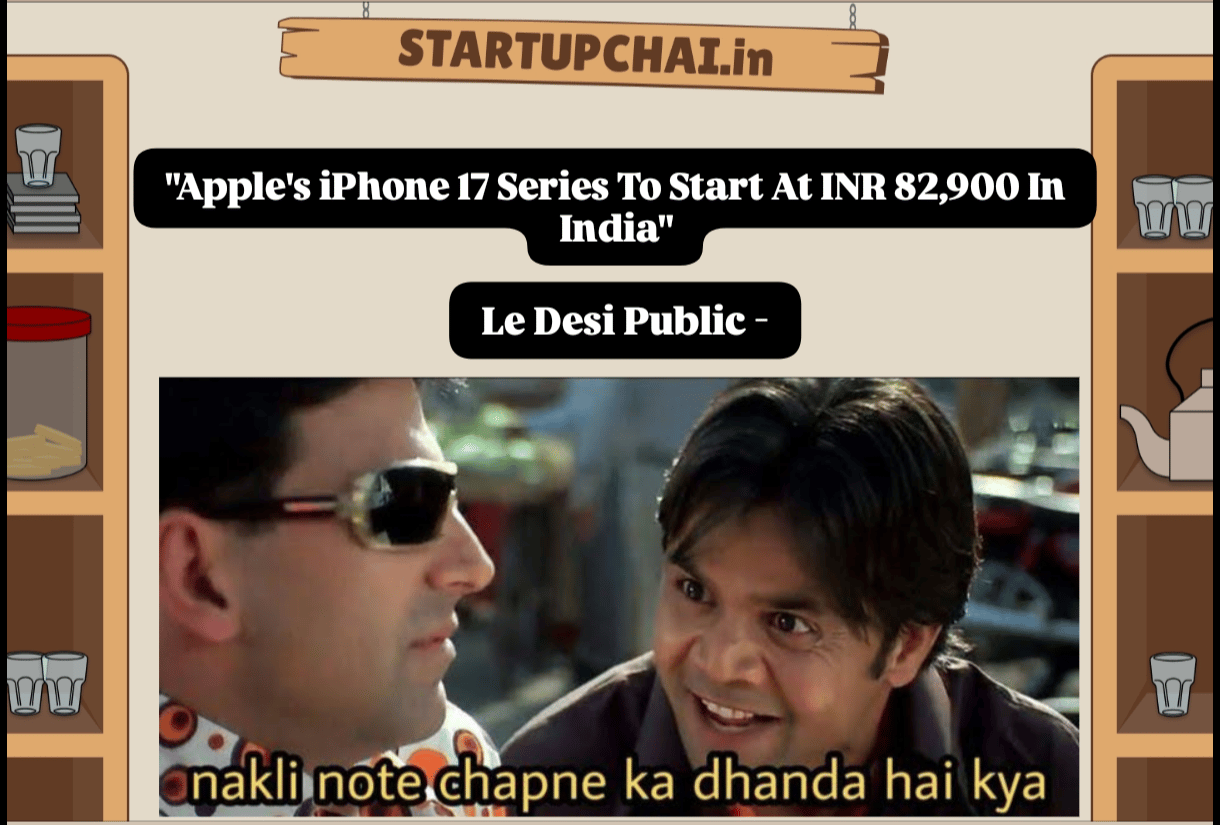- Startup Chai
- Posts
- Licious Bows Out, Swiggy Instamart’s Print Store, and iPhone 17 Series
Licious Bows Out, Swiggy Instamart’s Print Store, and iPhone 17 Series
Plus India’s AI Leap, and fundraising news about EndureAir, Asaya, and Presolv360

A few days ago, when Licious pulled the plug on its plant-based brand UnCrave, the headlines made it look like a verdict on India’s alternative protein industry. In truth, it was less about the market and more about Licious’s own priorities. The company, flush with $550 million in funding and staring at a planned IPO in 2026, has been under pressure to cut burn and show profits. From a peak monthly burn of ₹20–22 crore, it has managed to bring this down to about ₹7-8 crore. In that calculus, UnCrave - a venture struggling to scale and saddled with an awkward brand positioning - was always going to be a casualty.
The paradox of UnCrave was obvious. It was a vegetarian product sold through a meat-first app. Licious thought it could leverage its three-million-strong meat-buying base and cross-sell to them during “abstinence seasons” like Navratri. But flexitarian buyers were unconvinced, and vegetarians were never going to download a meat app to buy their “meat-free” options. Consumer trust and identity in food are sticky, and UnCrave never carved out an independent space.
And yet, the timing of this exit is striking. Just as Licious bowed out, the government slashed GST on plant-based meats and milks from 12-18% to 5%, removing the single biggest affordability barrier. For a sector where price sensitivity has long throttled mass adoption, this policy change could be the inflection point. Licious’s decision to retreat may look like financial discipline today, but in hindsight, it could be remembered as walking away right before the tide turned.
Meanwhile, other players are staying in the fight. GoodDot, one of India’s oldest alt-meat startups, has raised $5 million and sells affordable, shelf-stable products like UnMutton Keema. Imagine Meats, backed by Genelia and Riteish Deshmukh, is banking on desi flavors like biryani and kebabs with ADM as a global partner. Blue Tribe, supported by Virat Kohli and Anushka Sharma, is going after Gen Z with digital-first campaigns. Shaka Harry has raised $2 million with a “just-like-chicken” positioning. Even ITC and Tata Consumer are circling, with their FMCG distribution muscle.
Globally, the market is at a different stage. In the U.S., Beyond Meat’s stock is down 97% from its peak, sales fell 7% in 2024, and the company lost 45 cents on every dollar sold. Impossible Foods has been forced into layoffs. The global plant-based hype cycle has turned into a sobering correction. But India is not in contraction; it’s still in the messy, formative years of growth. Market size estimates vary wildly - from $98.6 million (IMARC) to $552 million (Mordor) in 2024 - highlighting just how early the industry is.
The barriers are real: high costs, weak cold chain, poor taste attributes in some products, and family-level resistance (a third of households report reluctance from others to even try plant-based options). Awareness is still shallow; only 27.5% of Indians even know the category exists. But the opportunity is undeniable. 80% of India is protein-deficient, and 93% don’t know their daily protein requirements. That is a gap begging to be filled.
What UnCrave’s closure really shows is the danger of short-term thinking. Licious trimmed fat to please investors, but in doing so it may have surrendered an early-mover edge. The next chapter will be written by startups that get the trifecta right: taste, affordability, and convenience. With GST cuts leveling the field, localized flavors finding traction, and conglomerates stepping in, the space is far from dead. If anything, UnCrave’s demise clears the way for those willing to play the long game.
The Indian plant-based meat sector is still in its adolescence. Licious leaving doesn’t mark the end - it only proves that this market won’t be won by half-measures or misplaced bets. It will be won by companies that understand both the flexitarian Indian consumer and the long patience required to build new food habits in a country where price and tradition dominate.
Let’s go through what else is happening in Indian startup world - Grab your simmering cup of StartupChai.in and unwind with our hand-brewed memes.

“Kuch Daring Karna Hai Mujhe”: Swiggy Instamart launches Print Store as it looks to expand non-grocery options
Swiggy Instamart has introduced a Print Store service, allowing users in Bengaluru, Mumbai, and Delhi to order urgent printouts alongside their groceries.
Positioned as part of its broader move beyond grocery delivery, the service addresses everyday needs like late-night school projects or essential travel documents. With this step, Instamart continues to expand its role as a one-stop provider for urban conveniences.
Read more here

“Raste Ka Maal Saste Mein”: Apple’s iPhone 17 Series To Start At Only INR 82,900 In India
Apple’s new iPhone 17 series is here, with prices starting at only ₹82,900 for the base model in India. The lineup includes iPhone 17, iPhone Air, iPhone 17 Pro, and the top-end iPhone 17 Pro Max, which begins at a steep ₹1.5 lakh.
The devices will be available in India from September 19, following the global “Awe Dropping” launch event.
Read more here


“AI Ki Shakti, Sab Par Bhari”: Centre To Set Up 600 Data Labs & Deploy 38K GPUs, Says IndiaAI Mission CEO
India is gearing up for an AI leap, with the Centre planning 600 data labs and deploying 38,000 GPUs under the IndiaAI Mission.
CEO Abhishek Singh stressed the need for ethical AI frameworks to curb misinformation while boosting research and innovation. Access to this massive compute power could cost innovators as little as ₹65 an hour, making AI experimentation more affordable than ever.
Read more here

Dronetech startup EndureAir has raised ₹25 Cr from IAN Alpha Fund to scale its high-altitude logistics and aerial robotics platforms. With nine patents in VTOL tech and fully in-house R&D, it stands against rivals like ideaForge and Asteria Aerospace.
Read more hereD2C skincare brand Asaya has secured ₹28 Cr in a pre-Series A round led by RPSG Capital to fuel new product launches. The funds will also support an innovation centre as the startup gears up to roll out six skincare products over the next year.
Read more hereAviral Bhatnagar’s AJVC has closed its debut fund at ₹200 Cr, backed by global institutions, family offices, HNIs, and startup founders. The fund has already invested in 25 startups across SaaS, AI, consumer tech, and B2B, typically deploying ₹1.5 Cr for a 9% stake.
Read more hereOnline dispute resolution platform Presolv360 has raised $4.7 Mn in a Series A round led by Elevation Capital with support from MGA Ventures and angel investors. The funds will be used to scale its tech infrastructure and strengthen its team amid growing competition.
Read more hereUrban Company has raised ₹854 Cr from anchor investors ahead of its IPO, allotting 8.29 Cr shares at the upper price band of ₹103 each. Big names like Goldman Sachs, HDFC MF, and ICICI Prudential were among the 59 investors backing the allocation.
Read more hereAI-driven data security startup Aurva has raised $2.2 Mn in a seed round led by Nexus Venture Partners, with participation from DeVC and industry veterans. The funds will help scale its sales, expand its security team, and enhance AI capabilities to counter real-time cyber threats.
Read more here
How did today's serving of StartupChai fare on your taste buds? |